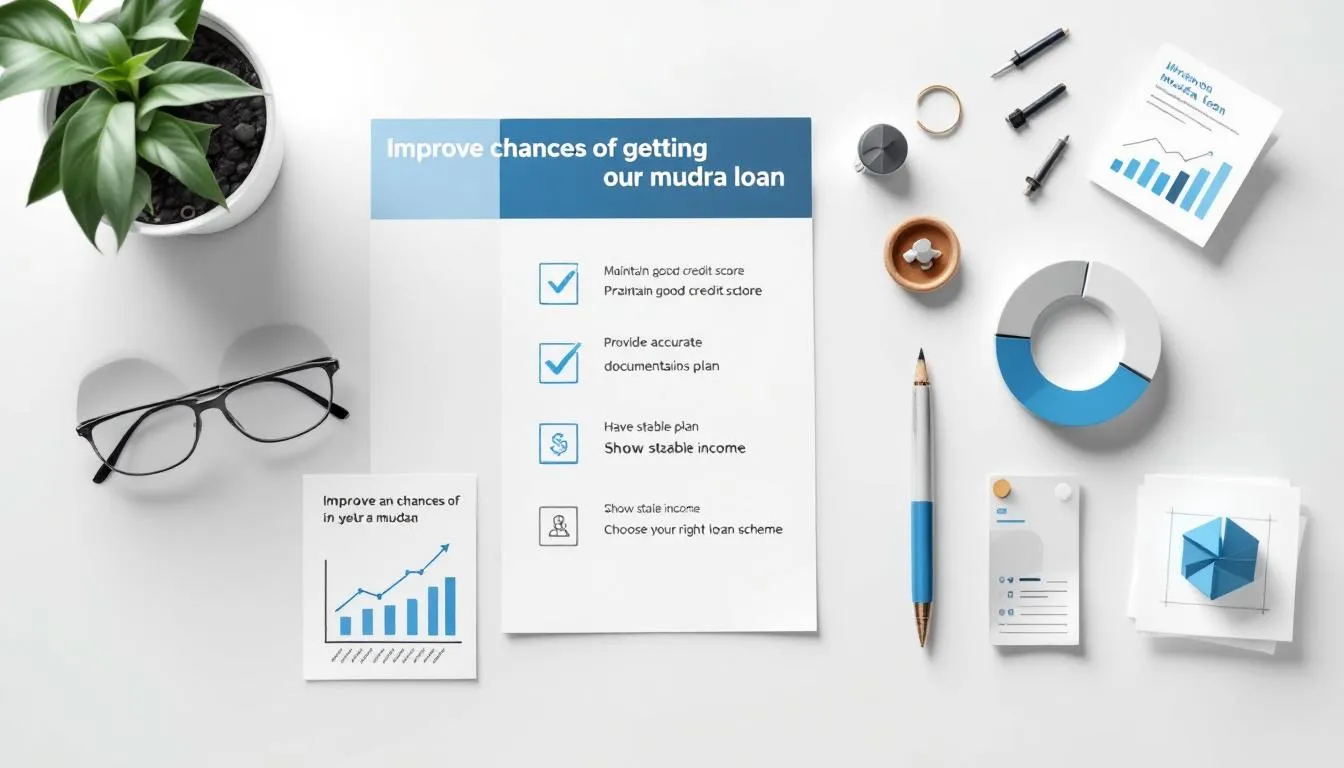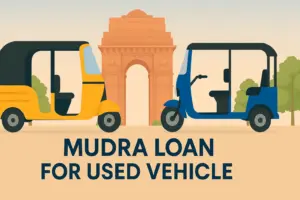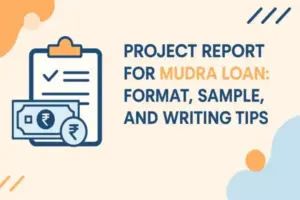Yes, you can qualify for a Mudra loan without a CIBIL score. This article will show you how to secure funding through the Mudra scheme, even with no credit history or a low credit score, making it possible to obtain a MUDRA LOAN WITHOUT CIBIL SCORE. Read on to learn the steps and requirements you need to meet.
Key Takeaways
- The Mudra Loan Scheme facilitates loans up to ₹10 lakh for small and micro enterprises without the need for a CIBIL score, aiming to promote financial inclusion.
- Applicants must be Indian citizens between 18 to 65 years, operating in income-generating sectors, and a well-prepared business plan can enhance loan approval chances.
- Several banks and financial institutions provide Mudra loans without strict CIBIL checks, making them accessible to individuals with low or no credit history.
Introduction
The Mudra Loan Scheme under PMMY is a revolutionary initiative by the government aimed at promoting financial inclusion. The scheme provides loans up to ₹10 lakh to non-corporate, non-farm small/micro enterprises. It’s a lifeline for many, especially those starting new ventures or expanding existing ones without needing a high credit score.
Aspiring entrepreneurs frequently question whether they can qualify for a Mudra loan without a CIBIL score due to the traditional reliance on credit scores for loan approvals. The Mudra scheme, however, aims to be inclusive, accommodating individuals with little or no credit history, and therefore opens opportunities for many previously excluded from the formal financial system.
Understanding CIBIL Score and Its Importance
CIBIL, which stands for Credit Information Bureau India Limited, is a credit scoring agency in India. It provides a numerical representation of an individual’s credit history, ranging from 300 to 900. A good credit score, typically 700 or above, significantly increases the likelihood of loan approvals, while a score below 650 is often considered a bad credit score and can hinder access to credit. A strong credit rating can also play a crucial role in this process. Additionally, reviewing your credit report can help you understand your credit standing better.
A CIBIL score is crucial as it reflects a person’s creditworthiness. Lenders use this score to assess the risk associated with lending money to an applicant. A high score signals a reliable borrower, whereas a low score can complicate the process of securing loans or credit cards. This knowledge can aid applicants in better preparing for loan applications.
Can You Get a Mudra Loan Without a CIBIL Score?

The government’s objective with the Mudra Yojana is to promote financial inclusion. This involves extending credit facilities to individuals without a credit history or those with a low credit score. The Mudra scheme is designed to support new-to-credit borrowers, making it possible to get a Mudra loan even without a CIBIL score.
Banks and financial institutions do provide Mudra loans to individuals without a CIBIL score, especially under the Shishu category, which offers loans up to ₹50,000. A well-prepared business plan and Udyam registration can significantly enhance the chances of loan approval, reflecting the borrower’s intent and business viability.
Types of Mudra Loans

Mudra loans are categorized into three types based on the loan amount to cater to the varying needs of small businesses. The shishu loans category offers loans up to ₹50,000, ideal for those starting with minimal capital requirements. The Kishore category ranges from ₹50,001 to ₹5 lakh, supporting businesses in their growth phase.
The tarun scheme offers loans up to rs ranging from ₹5 lakh to ₹10 lakh, ideal for businesses looking to expand and scale operations. These categories assist applicants in determining the appropriate loan amount for their needs.
Eligibility Criteria for Mudra Loans Without CIBIL Score
Applicants seeking Mudra loans must:
- Be Indian citizens aged 18 to 65 years, adhering to the minimum age and maximum age limit.
- Belong to various income-generating sectors like services, manufacturing, and trading.
- Note that existing businesses are also eligible, contrary to common belief.
Applicants seeking loans of less than ₹10 lakh are eligible to apply for a Mudra loan. Udyam registration can further improve eligibility by providing small businesses with access to various government schemes and support. Notably, a CIBIL score is not required, and applicants are not required to submit any collateral for a Mudra loan.
The government’s aim is financial inclusion, particularly for individuals with no credit history and low credit scores. Many recipients of Mudra loans without CIBIL scores have shared their positive experiences, illustrating the scheme’s supportive approach to new business owners.
Overcoming Barriers Posed by CIBIL Scores
A low CIBIL score can restrict access to substantial loan amounts, such as those offered under the Kishore and Tarun schemes. However, a high CIBIL score is not a prerequisite for securing a Mudra loan.
Applicants can enhance their chances by focusing on other factors like preparing a strong project report, obtaining Udyam registration, and approaching public sector banks.
Preparing a Strong Project Report
A comprehensive project report can significantly enhance the credibility of a loan application. It should clearly outline the business model, financial projections, and market analysis to demonstrate the viability of the business. Many successful applicants have emphasized the importance of a well-prepared project report in securing loan approval.
Including detailed financial projections and a realistic business plan can showcase the potential success of the business to lenders. This other document acts as a crucial tool in convincing lenders of the business’s viability and the borrower’s capability to repay the loan.
Obtaining Udyam Registration
Udyam registration facilitates easier access to various government schemes, including Mudra loans. Local government programs can offer additional support during the application process.
Essential documents like an Aadhar card, voter ID card, or driving license are required details for registration.
Approaching Public Sector Banks
Public sector banks often exhibit a more flexible attitude toward CIBIL scores, making them a preferable choice for loan applicants with poor credit history. Most banks are generally more accommodating regarding loan approvals, even with lower CIBIL scores compared to private banks.
A stable source of income strengthens your Mudra loan application. Public sector banks, being more lenient with CIBIL score requirements, can be a viable option for those seeking financial assistance. Approaching these banks can increase the likelihood of loan approval.
Alternative Evaluation Methods Used by Banks
Banks may use alternative methods to evaluate loan applications when traditional credit scoring is not available. Proof of income, such as salary slips or bank statements, can play a critical role in assessing a borrower’s creditworthiness. Transaction history is another important factor that banks consider.
Local inquiries about the applicant’s business or financial behavior are sometimes conducted to gather additional context for loan approval. Some financial institutions, like CASHe, offer loans to salaried individuals without heavily relying on credit scores, using alternative metrics for assessment. A financial institution lender may consider these factors during the evaluation process.
These methods provide an opportunity for individuals with poor CIBIL scores to secure funding.
List of Banks and NBFCs Providing Mudra Loans Without Strict CIBIL Checks
Several public sector banks and regional rural banks extend Mudra loans without strict CIBIL score requirements, catering to small and micro businesses. Small finance banks and microfinance institutions are also known to provide Mudra loans, focusing more on the business viability rather than the borrower’s CIBIL score.
Many individuals have successfully acquired Mudra loans despite lacking a CIBIL score, showcasing the scheme’s accessibility for new entrepreneurs. A comprehensive list of banks and NBFCs providing loans without strict CIBIL checks includes:
- Public Sector Banks
- Regional Rural Banks
- Small Finance Banks
- Micro Finance Institutions tied to MUDRA.
Success Stories of Mudra Loan Recipients Without CIBIL Scores

Sarita Devi, a rural homemaker, used a Shishu scheme loan of Rs. 30,000 to start dairy farming, creating a sustainable income source for her family. Similarly, Rajani Sharma launched a clothing boutique with a Rs. 2,00,000 loan under the Kishor category, contributing to her community’s fashion culture while generating local employment.
Neha Singh set up a food processors unit using a Tarun loan of Rs. 7,00,000, preserving local culinary traditions and creating job opportunities for women in her village. These stories highlight the importance of having a well-thought-out business idea and a reasonable plan to secure a Mudra loan.
Entrepreneurs have reported using Mudra loans to purchase essential equipment for their businesses, enabling them to enhance production capabilities and grow their operations. These success stories emphasize the accessibility and impact of Mudra loans for individuals without high CIBIL scores.
Common Myths About Mudra Loans and CIBIL Scores

A common myth is that a high CIBIL score is necessary to secure a Mudra loan. However, specialized loan products are available for individuals with low CIBIL scores, designed to help them secure funding despite credit challenges.
Another misconception is that all Mudra loans are backed or guaranteed by the government; many are provided by banks and financial institutions without such guarantees. It is also falsely believed that the loan amount is fixed and cannot be tailored; however, loan amounts can vary based on individual needs and project requirements.
These myths often deter potential applicants, but understanding the true criteria and flexibility of Mudra loans and loan eligibility can encourage more individuals to avail themselves of the opportunity to apply.
Tips to Improve Your Chances of Getting a Mudra Loan

Offering collateral for a loan can significantly increase the chances of approval as it reduces the lender’s risk. Some lenders provide loans based on a guarantor’s financial stability rather than the primary applicant’s credit score. Having a bank account with the lending institution may also improve your chances of approval, meeting the loan requirement.
Individuals with low CIBIL scores might consider the following to improve their creditworthiness and enhance the chances of obtaining a Mudra loan without a CIBIL score:
- Work with credit advisors to improve creditworthiness.
- Prepare a strong project report.
- Obtain Udyam Registration.
- Approach public sector banks.
Summary
In conclusion, obtaining a Mudra loan without a CIBIL score is not only possible but also accessible for many aspiring entrepreneurs. The key lies in understanding the eligibility criteria, preparing the necessary documentation, and exploring alternative evaluation methods used by banks.
The Mudra Loan Scheme under PMMY is a lifeline for those seeking financial inclusion. By following the guidelines and tips provided, individuals can improve their chances of securing a loan and achieving their business goals. Don’t let the lack of a CIBIL score hold you back—take the first step towards your entrepreneurial journey today.
Frequently Asked Questions
Can I apply for a Mudra loan without having a CIBIL score?
Yes, you can apply for a Mudra loan without a CIBIL score, as the scheme aims to promote financial inclusion for those with no credit history or low scores.
What are the different categories of Mudra loans?
Mudra loans are classified into three categories: Shishu (up to ₹50,000), Kishore (₹50,001 to ₹5 lakh), and Tarun (₹5 lakh to ₹10 lakh), each designed to meet varying financial requirements of small businesses.
What documents are required to apply for a Mudra loan?
To apply for a Mudra loan, you will need a comprehensive project report, proof of identity (such as an Aadhar card, voter ID, or driving license), and Udyam registration, with no collateral required.
Which banks provide Mudra loans without strict CIBIL checks?
Public sector banks, regional rural banks, small finance banks, and microfinance institutions typically offer Mudra loans without stringent CIBIL score checks. This flexibility makes it easier for borrowers with varied credit backgrounds to access funding.
How can I improve my chances of getting a Mudra loan without a CIBIL score?
To enhance your chances of securing a Mudra loan without a CIBIL score, focus on preparing a comprehensive project report, obtaining Udyam registration, and approaching public sector banks. Additionally, demonstrating a stable source of income and providing collateral can significantly strengthen your application.
- Rejected Mudra Loan – What to Do Next? Appeal Process Explained
- Mudra Loan for Used Vehicle: Benefits, Interest Rates, and Eligibility Criteria
- Is the Mudra Loan Subsidy Real or Fake? Get the Facts Here
- Get Your Mudra Loan Approved: Write a Perfect Project Report with This Guide
- Mudra Loan Without CIBIL Score: How to Qualify and Apply
- Mudra Loan Without PAN Card: Eligibility & Application Process Explained
- Secure Your Future: Mudra Loan for Salaried Person Explained
- Mudra Loan for Senior Citizens or Retired Persons – Eligibility, Benefits & Myths
- Mudra Loan for Disabled Persons: Eligibility, Interest Rates, and Benefits
- Best Tips for Securing a Mudra Loan for SC ST Applicants
- Top Benefits of Mudra Loan for Women Entrepreneurs
- How to Get Mudra Loan for Franchise Business in India
- Mudra Loan for Home Business: How to Apply and Benefits
- Can I Get Mudra Loan Without GST or Udyam Registration?
- Mudra Loan for Amazon Seller, Dropshipping, and Affiliate Marketing – Is It Possible?
- Best Mudra Loan for Housewives – Empowering Women Across India
- Top Reasons for Mudra Loan Rejected and How to Fix Them
- Best Business Idea Under Mudra Loan 5 Lakh for 2025
- Mudra Loan for Used Machine: Eligibility, Interest Rates & Benefits



















